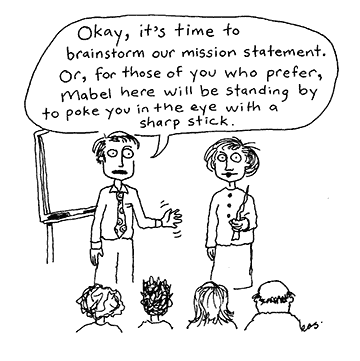How to Use Meeting Skills From the Workplace to Improve Conversations With Your Kids
We said this in our last post and we’ll say it again:
You get what you tolerate.
When you tolerate subpar behavior from your family members, your colleagues or your significant other, that’s what you’ll get.
Meetings, in their truest form, are conversations – and conversations are a constant in our lives. Whether we’re at work, with family, or socializing – they allow people to connect and understand each other better.
What if you could improve conversations with your kids – and even have them buy in to the idea?

Although we usually write about how to run great business meetings, today we’re focusing on how to apply those same skills to improve communication within a family and avoid misunderstandings.
The topic of today’s post comes from the yet to be released 2nd edition of Ten Powerful Things to Say to Your Kids by Paul Axtell.
In this book, Paul’s advice from decades of helping people to be more effective in the workplace turns to the home front to help parents create remarkable relationships with their children.
Named Best Parenting Book of 2012, Ten Powerful Things to Say to Your Kids empowers parents to be more conscious of what they say and how they speak to their kids. Paul is also author of the award-winning book Meetings Matter: 8 Powerful Strategies for Remarkable Conversations, and Being Remarkable.
In addition to his books, Paul is also a Lucid Meetings template designer and guest author. We are thrilled to have him back to help parents improve relationships with their kids and create long-lasting, effective family agreements.
Don’t miss the free chapter download from the new book at the end of the post!
Reclaim Dinnertime as Family Time
Many parents face the same issue: claiming dinnertime as family time.
It might seem impossible with parents working two jobs, kids being driven to a seemingly never ending series of activities—yet we always enjoy the moments when life slows enough for us to be with each other and talk.
Many families start when kids are small and anxious to tell what is happening at school. The conversations are simpler then:
- What did you learn at school today?
- What was the best part of your day; or worst?
It’s both a way to stay in touch with what is happening in our kids lives and developing a practice of talking together as a family.
As children grow, this practice becomes increasingly difficult. Life gets in the way and everyone goes in their own direction.
Ask yourself this question: What conversations are not occurring in your household that are the most scary to suggest, but would be meaningful if the conversation took place?
One conversation that might be useful to many families would be about the use of technology – especially at the dinner table.
We all know that smartphones are addictive, and almost everyone has trouble putting them away. There’s even a term for it: Technoference.
Technoference is the interference of technology in our relationships, in our work, and in our day-to-day lives.
If you’re ready to commit to family meals without technology and getting to know your kids better, then the Family Agreement is for you! Working the technology topic in as a part of a broader conversation about agreements or house rules will make the conversation easier to have.
However, to make this stick, you must follow the same technology rules for yourself as you do for your kids. They will follow your example, and although they may not admit it, they look to you to set the social norms of the household.
Tool: Family Agreement (or House Rules)
One tool we firmly believe in here at Lucid Meetings is agreements. We have our own team working agreement, and it works quite well for us.
You may know them as Ground Rules, Team Agreements, Code of Conduct, or even Agile Manifesto – yet they all accomplish the same goal.
Today we’re focusing on the Family Agreement. This agreement specifies how you plan to behave as a family – how you’ll treat each other, who is responsible for what, and what to do when problems arise.
These aren’t hard and fast rules that will never be broken – they’re simply guidelines put in place ahead of time, and they should change as the family changes.
First things first: When creating your agreement, be sure to involve the entire family – even young children. If you allow everyone to contribute, they will be more likely to understand and abide by the rules they’ve helped create.
Below is a sample agreement you can use to brainstorm with your family to start building your own. You may notice that some of these rules were borrowed from our last post about improving engagement in meetings, because they also apply to families.
Sample Family Agreement
#1: Start each meal with A check-in on emotional states
- Allow everyone to be honest about where they’re starting from. For them to feel present, it helps to have the space to say if they feel off and why.
- If one person isn’t willing to contribute and needs alone time, allow them to be excused, take all the time they need, and eat once they’ve had a chance to cool down.
#2: no technology at the dinner table
- Use a bowl or basket for everyone’s smart phone or tablet.
- Talk through with your kids why this is important. Technology can be addictive, and lead to poor behavior.
#3: Have a go-around where each person gives a compliment
- This habit may seem awkward at first, but after some time the awkwardness will fade. If they know they’ll be asked, family members will begin think throughout the day about who deserves their compliment.
- Using this rule in your household reinforces positive behavior.
#4: Ask EAch other meaningful QUestions
We all think we know our family members, but as children grow and have experiences they will change – and so do parents. Examples:
- Did anyone make a mistake this week, do something that you wish you hadn’t, and would love to have a do-over?
- Did anyone help out or contribute to someone at work or school or in the neighborhood or at church that made you feel good? What did you do and how did you feel afterwards?
- Is anyone losing sleep or worrying about something?
- If you could ask for something from the family that would really help you, what would it be?
#5: Create a family chores list
- Create the list and hang it in a place for everyone to see.
- Allow family members to sign up for what they’d like to do – first come, first serve.
- Hold each other accountable, and determine one day or time that you can all do chores together. Turn the music up, and make it fun. Order pizza!
#6: At least twice a week, have a round table discussion.
- Each time, someone new will pick the topic of conversation.
- We’ll also keep a jar of questions and when no one has a new question, we’ll reach into the jar.
- The person choosing the question also gets to determine who goes first.
- Everyone goes around once while everyone just listens and then anyone can enter the conversation.
#7: Respect each other as human
- Assume best intentions, but do not assume anything else. Ask questions to better understand anything that is unclear or troubling.
- Listen when others speak, and don’t interrupt.
- Treat each other with kindness and tolerance first. We all have tricky days when we aren’t at our best. You will appreciate this tolerance when that tricky day is yours.
#8: Everyone is responsible for enforcing the family agreement
Notice when you have strayed, and speak up. This one gives you and everyone else permission to say something if you feel there’s a problem.
Frequently on Pinterest you will see chalkboards of house rules—I like the ones that include: this family hugs!
Sometimes, we need to prepare for a conversation by watching a YouTube video or reading something. This can be especially helpful when starting a conversation about technology. Each family member gets to speak after reading the article for 3 minutes about what they think.
Creating your family’s agreement may not be easy at first, but you will reap great rewards if you’re willing to put in the time and energy. Creating an understanding with your family about how your family will interact helps everyone participate, understand each other better, and feel heard.
I will leave you with this:
Time is precious. Conversation can be trivial or magical.
More Resources & Chapter Download!
- Why All Our Kids Sign A Family Technology Agreement by TODAY Parenting Team
- Flipping Parenting: My Family’s Media and Tech Agreement by Psychology Today
- Six Ways to Improve Meal Times with Your Children by The Conversation
- Conversation Starters for Different Age Groups by The Family Dinner Project
Download Chapter Four of Ten Powerful Things to Say to Your Kids to learn much more about agreements you can make with your kids to take your relationship and dinner conversations to the next level:



